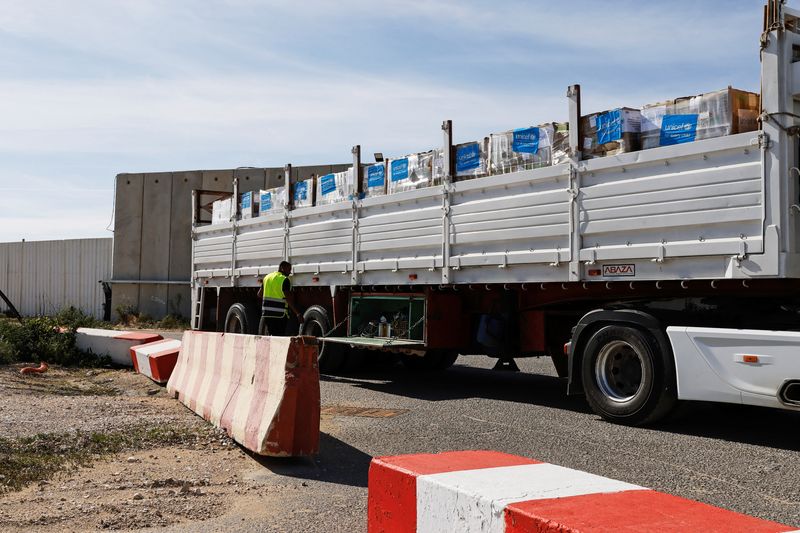Israeli officials mull arming some Gaza civilians as aid security crumbles-report

An Israeli security official inspects a truck carrying aid on its way from Egypt to the Gaza Strip via the Kerem Shalom crossing, amid the ongoing conflict between Israel and the Palestinian Islamist group Hamas, in southern Israel, January 8, 2024. REUTE
JERUSALEM (Reuters) – Israeli officials have discussed arming some civilians in Gaza to provide security protection for aid convoys into the besieged enclave, as part of wider planning for humanitarian supplies after fighting ends, the Israel Hayom daily said on Friday.
With civil order increasingly strained in Hamas-run Gaza and municipal police refusing to provide security to convoys because of the risk of being targeted by Israeli forces, the issue of secure distribution of supplies has become a major problem.
The civilians would not be linked to militant groups including Hamas but it remained unclear who they might be, the newspaper said. It said Prime Minister Benjamin Netanyahu had postponed a decision on the issue.
The Prime Minister’s office declined to comment on the report, which came a week after dozens of Palestinians were killed in an incident in which crowds surrounded a convoy of aid trucks entering northern Gaza and troops opened fire.
The incident underlined the chaotic conditions in which aid has been delivered into Gaza, where the United Nations has warned of the growing threat of famine after more than five months of war.
“We were not carrying weapons or anything, we are civilians. We wanted to get food because we are starving here in Gaza,” said Mustafa Lolo, who said he was shot in the legs trying to get aid.
On Friday, the Israeli military released the results of a review of the circumstances behind the Feb. 29 truck convoy incident and repeated that troops had only fired at individuals they felt posed a threat.
“The command review found that IDF troops did not fire at the humanitarian convoy, but did fire at a number of suspects who approached the nearby forces and posed a threat to them,” it said in a statement.
Hamas rejected the report which it said was an attempt to exonerate soldiers from the “horrific crime”.
Palestinian health authorities said that more than 100 people were killed in the incident, most shot by Israeli troops. Israel has previously said most of the dead and wounded were trampled or run over as people scrambled for supplies.
BREAKDOWN OF CIVIL ORDER
UN agencies had no connection with the convoy, which was operated by private contractors and overseen by the Israeli military, however they have said aid deliveries have become increasingly difficult amid a general breakdown in civil order.
“When fighting continues, when people are desperate, when the social fabric is torn down and lawlessness is on the rise, it gets harder and harder for us on the other side – once it’s been checked and verified – to receive and distribute safely,” U.N. Humanitarian and Reconstruction Coordinator for Gaza, Sigrid Kaag, told reporters this week.
In a report on Wednesday, the United Nations humanitarian agency OCHA pointed to “the diminished presence of local police, following a spate of attacks by Israeli forces that led to police casualties”.
Israel says its goal in the war is the destruction of Hamas, following the militant Islamist group’s rampage into its territory on Oct. 7 in which Israeli officials say it killed 1,200 people and abducted 253.
The ground and air offensive launched by Israel in response against the densely populated Gaza Strip has killed at least 30,878 Palestinians, Gaza’s health ministry says.
As part of plans for running Gaza after the war, Israeli Prime Minister Benjamin Netanyahu has considered empowering local representatives not affiliated to Hamas or other militant groups, but it is unclear who such people may be.
Gaza has a number of large traditional family clans, affiliated with political factions including Hamas and Fatah, the rival group that dominates the Palestinian Authority in the occupied West Bank.
Some of the larger clans in Gaza City and elsewhere are believed to be well-armed but they have a long history of clashing over rival interests and there has been no indication that they would consider working with Israel.








